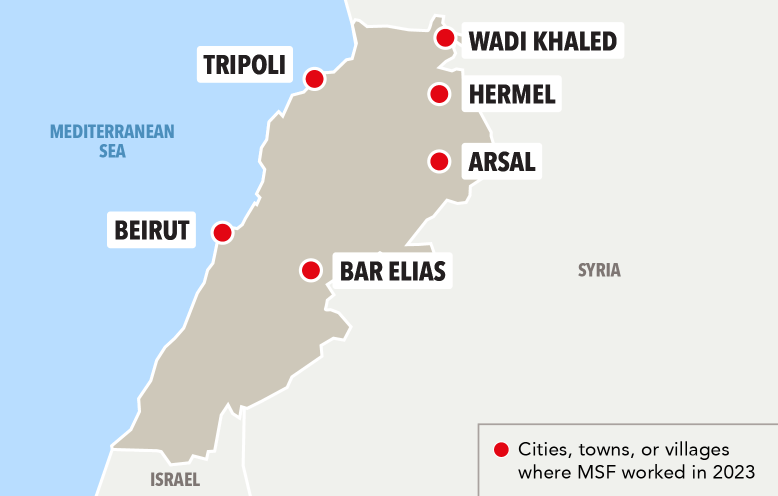In addition, we are working to reinforce the national health care system and support local organizations affected by the socioeconomic crisis. This includes capacity building through training and the provision of medicines and medical supplies to public health care centers, especially in Tripoli, northern Lebanon.

Lebanon 2022 © Carmen Yahchouchi
Lebanon
Providing medical and humanitarian assistance to migrants, refugees, and people internally displaced by conflict.
Post-ceasefire, people in Lebanon still struggle to access health care
January 21, 2025 — Massive humanitarian needs persist in Lebanon two months after the ceasefire agreement reached on November 27 between Lebanon and Israel.
Read more
Our work in Lebanon
As Lebanon’s socioeconomic crisis has deepened, Doctors Without Borders/Médecins Sans Frontières (MSF) continues to provide health care for vulnerable communities, including refugees and internally displaced people, and supports the national health care system through capacity building and medical donations.

What's happening in Lebanon?
Lebanon hosts 1.5 million Syrian refugees, 400,000 Palestinians, and over 160,000 migrant workers, many of whom live in precarious conditions. Our teams assist the most vulnerable communities by providing reproductive, maternal, and pediatric care, as well as mental health support, treatment for chronic diseases, and routine vaccinations for children at our clinics across the country.

How we're helping in Lebanon
We continue to adapt our long-term activities to cover the needs of Lebanese people, as well as refugees and migrants, who often have limited access to medical care. Lebanon is home to an estimated 1.5 million refugees, mainly Syrians and Palestinians, many of whom live in precarious conditions in displacement camps. The country also hosts around 250,000 migrant workers.

How we're helping
167,900
Outpatient consultations
48,100
Routine vaccinations
11,700
Individual mental health consultations
3,100
Births assisted
*Data from MSF International Activity Report 2023
More news and stories
Learn about MSF’s journalistic roots and our commitment to bear witness and speak out about the plight of the people we treat.

Story Jan 30, 2025
Lebanon: MSF boosts emergency operations as Israeli attacks continue p...
Read moreLearn about MSF’s journalistic roots and our commitment to bear witness and speak out about the plight of the people we treat.





